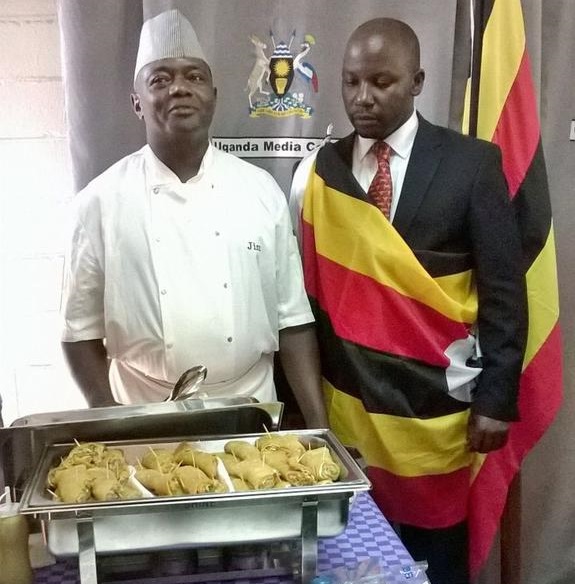
OPINION: By Fred Muwema
The current local and International buzz about Uganda’s Rolex (a rolled chapati with eggs and vegetables) appears to be restoring a little pride to some Ugandans. In June 2016, CNN named Uganda’s Rolex as the fastest growing fast food in Africa. Since then, the Rolex festival was launched at the Uganda Museum on Aug. 21 with a Miss Busoga Tourism Beauty Queen and government officials falling over each other to promote it as a tourist attraction.
The strong emotive arguments both for and against promoting ‘Uganda’s Rolex’, as a signature dish which will lure tourists to take a bite cannot persuade me from questioning the legality of Uganda’s claims to the name Rolex. Rolex is an International and well known trademark owned by Rolex S.A, a Company founded in the U.K in 1905 but which later moved to Switzerland in 1919.
Rolex is famed for making luxury wristwatches, which are a standout status symbol worldwide. Uganda first registered the Rolex trademark as a foreign trademark on February 20, 1970 and that Company still holds trademark licenses to-date. The trademark covers wristwatches and other products like machine tools, precious metals and stones, jewelry, nautical and optical instruments, business management and office management functions among others, under the various classes in which it is registered. It, however, does not include food.
That Rolex is not registered as a Food Trademark in Uganda, does not mean the name is available to be used to sell food and/or any other product. To do so would amount to trademark dilution of the original Rolex trademark famed for its high-end goods of ostentation.
Trademark dilution is a legal protection giving the owner of a famous trademark standing to forbid others from using the mark in a way that would lessen its uniqueness.
In most cases, trademark dilution involves an unauthorised use of another trademark on products that do not compete with and have little connection with those of the trademark owner.
Clearly the Luxury Rolex Watch has nothing in common with our chapati. The Ugandan Rolex can also be accused of tarnishing the name of the Grand Rolex. Trademark tarnishing occurs when the mark is weakened through unsavoury or unflattering associations. Jokes like “In Uganda we don’t wear the Rolex, we eat it” which were attributed to the BBC in 2015 are not associations of high affinity by any measure.
Whatever opportunities may attach to our delicacy, we cannot parade it on the International scene, under the name ‘Rolex’ in violation of the intellectual property rights of others found in the Trade Related Aspects of Intellectual Property Rights (TRIPS) 1994 to which Uganda is a signatory.
The idea of recognising and promoting local delicacies or foods is not novel as there are many countries which protect their delicacies/foods by registering them as Geographical indications (meaning rights accorded to a country which provides the natural habitat of a particular product).
Examples of well-known Geographical indications, which are exploited by the countries of origin, include Basmati rice from India, Champagne from France, Scotch Whisky from Scotland etc.
Though I doubt that our chapati meets the criteria of a Geographical indication, I am sure that even if it was, it cannot be registered under the name of a well-known Trademark such as Rolex.
The only option available to us is to rebrand our delicacy and promote it under another name, preferably a local name. Those innovating to promote Uganda as a tourist destination should be applauded, but they must be encouraged to use our abundant indigenous identity.
****
fmuwema@madvocates.com
****
editor@independent.co.ug
 The Independent Uganda: You get the Truth we Pay the Price
The Independent Uganda: You get the Truth we Pay the Price




In spite of the good legal argument presented by Mr Muwema, people in Uganda will continue calling that particular dish it by its name – ROLEX. Forget the goods of ostentation story, the Ugandan Rolex is for eating, period! If you went to any eatery today in Uganda and asked for a rolex, I don’t think anyone would give you a watch. Even if you went to the Serena or Sheraton and asked for a rolex, you would get just that – omelette rolled in a chapati. If a tourist comes to Kampala and asks for Rolex, they will be taken straight to the roadside chapati maker in Wandegeya not to a posh jewelry shop. I’m sure even before CNN promoted Rolex as the fastest growing fast food in Africa they knew about the intellectual property rights. The Ugandan rolex is not about to be renamed. “In Uganda we don’t wear ROLEX, we eat it!” That’s what I read on the T-shirts of many bazungu tourists who have been to Uganda.